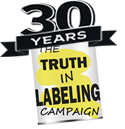MSG
Manufactured vs Natural Glutamic Acid
Ingredient Names Used to Hide MfG
 E-numbers used for ingredients that contain MSG
E-numbers used for ingredients that contain MSG
E-numbers are numerical designations developed within the European Community (EC) for declaration of foodstuff additives. There are a number of sources for lists of E-numbers on the Internet, easily identified using search engines. We have made no attempt to review all of them, and recommend the following outside links (here, and here) only to give you some handy references.
Food additives are the only foodstuffs that are given E-numbers. But not all food additives are included.
Very few food additive/ingredients that contain processed free glutamic acid (MSG) are considered additives for the purposes of assigning E-numbers. Note, also, that food additives are classified according to the use or function for which they have been declared.
There are many ingredients and food additives that contain processed free glutamic acid (MSG) and cause adverse reactions in MSG sensitive people -- additives/ingredients like gelatin, autolyzed yeast extract, and hydrolyzed soy protein, for example, that are not identified as additives and, therefore, are not on the E-number list. Others, which may be identified as additives, are not identified as (classified as) flavorings.
The following are six additives with names that clearly indicate that they contain processed free glutamic acid (MSG):
E620 Glutamic acidAspartame contains neurotoxic aspartic acid. Aspartic acid and L-cysteine are both excitotoxins -- neurotoxic amino acids as potent, or more potent, than the excitotoxic/neurotoxic glutamic acid found in MSG. People who react to processed free glutamic acid (MSG) typically react similarly to aspartame, and vice versa, provided that they ingest amounts that exceed their individual tolerances for the substances:
E621 Monosodium glutamate
E622 Monopotassium glutamate
E623 Calcium diglutamate
E624 Monoammonium glutamate
E625 Magnesium diglutamate
E951 AspartameCarrageenan causes MSG-reactions in great numbers of MSG-sensitive people. There are various forms of carrageenan. We don't know whether carrageenan contains MSG or creates MSG during processing:
E920 L-Cysteine [Added in October 1998 by Directive 98/72/EC]
E407 CarrageenanDisodium guanylate and disodium inosinate do not contain MSG, but work synergistically with free glutamic acid. When disodium guanylate and disodium inosinate are found on a food label, consumers can be fairly certain that the labeled product contains some hidden processed free glutamic acid (MSG). Disodium guanylate and disodium inosinate are relatively expensive food additives that would not be cost effective if they were not used in the presence of MSG:
E627 Disodium guanylatePeople with little tolerance for processed free glutamic acid (MSG) report reactions to pectin and to citric acid. Most of the citric acid used in formulating food ingredients comes from corn rather than from citrus fruit:
E631 Disodium inosinate
E440 Pectins (i) pectin (ii) amidated pectinThe E list includes a number of starches. These ingredients may include small amounts of processed free glutamic acid (MSG) that may cause reactions in MSG-sensitive individuals who have very little tolerance:
E330 Citric acid
E331 Sodium citrates (i) Monosodium citrate (ii) Disodium citrate (iii) Trisodium citrate
E332 Potassium citrates (i) Monopotassium citrate (ii) Tripotassium citrate
E333 Calcium citrates (i) Monocalcium citrate (ii) Dicalcium citrate (iii) Tricalcium citrate
E380 Triammonium citrate
E472c Citric acid esters of mono- and diglycerides of fatty acids
E1505 Triethyl citrate
E1405 Enzyme treated starchHighly MSG-sensitive people should also avoid Polydextrose:
E1401 Acid treated starch
(Dextrin, bleached starch, starches modified by acid, alkali and enzyme or by physically treatment are not considered as food additives in the context of the EEC Directive 95/2/EC.)
E1200 PolydextroseThe E list also includes a number of ingredients that include the word "phosphate." Although phosphates do not seem to contain processed free glutamic acid (MSG), some MSG-sensitive people with little tolerance for MSG react similarly to phosphates. Although the reason(s) for such reactions are not known, we do know that phosphates affect calcium and magnesium levels in the body. Calcium and magnesium are involved in the metabolism of glutamic acid.

